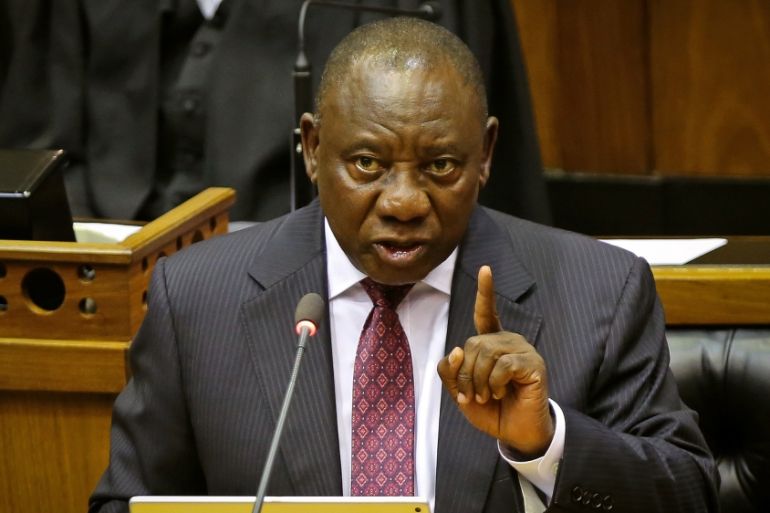South Africa’s Ramaphosa says ANC needs renewal to regain support
The governing party marks its 110th anniversary while engulfed in bitter factional rivalries and corruption allegations.

South African President Cyril Ramaphosa has said the governing party, the African National Congress, must work to regain popular support after being embroiled in corruption scandals and divided by bitter factional rivalries.
Marking the ANC’s 110th anniversary on Saturday, Ramaphosa struck a sombre note, emphasising that the party of Nelson Mandela which helped South Africa achieve democracy, has lost voter backing.
Keep reading
list of 3 itemsSouth Africa ex-president Zuma ordered to return to jail
S Africa: Ramaphosa admits rampant graft during time as Zuma VP
“We must be forthright in recognising, and deal decisively with, the reality that ANC structures are in a poor state,” Ramaphosa said.
“Many of them are focused on internal organisational conflicts, factionalism and furthering the self-interest of individual leaders rather than the aspirations of communities they are meant to serve.”
The anniversary event held in Polokwane in the northern Limpopo province comes days after a state-backed judicial investigation revealed how some of the party’s top officials had benefitted from corruption.
The ANC is also sharply divided between those backing Ramaphosa, who is also president of the party, and those loyal to former President Jacob Zuma, who has been embroiled in legal battles since he left office in 2018.
Zuma’s refusal to appear before the commission of inquiry saw him sentenced to 15 months in prison in July last year, which sparked riots that descended into widespread looting and destruction of property in the KwaZulu-Natal and Gauteng provinces.
More than 340 people died in the rioting.
Melanie Verwoerd, a former member of parliament for the ANC, told Al Jazeera that the governing party is “clearly struggling”.
“[The ANC now] is a very, very different party from the 1994 ANC party. At the moment, the party is struggling organisationally,” Verwoerd said.
“They are also struggling financially because of a new law that came in around political party funding. They have basically been bankrupt and not been able to pay their workers for a very long time,” she added.
The ANC came to power in 1994 when the country’s first democratic elections were held and Mandela became the first Black president.
However, its support has declined in recent years and it received less than 50 percent of votes cast in local elections in October, its worst-ever performance at the polls.
Ramaphosa said many who supported the ANC had punished it by not voting.
“Many citizens demonstrated their dissatisfaction with the ANC and its performance by staying away from the polls,” he said on Saturday.
Modibe Modiba, a co-founder and host of The Insight Factor – a digital media platform, told Al Jazeera the political dynamics of South Africa are changing and the ANC is being held accountable.
“The ANC has found it very difficult to dissociate itself from the corruption that happens in the country because the party itself is an integral part of the corruption that happens,” Modibe said.
“The ANC also finds itself in factional battles. The members of the party are no longer united, they fight among each other. We have seen state institutions used against the former president of the organisation,” Modibe said.
The ANC is set to hold its national elective conference later this year, where Ramaphosa is expected to seek a second term as the party’s leader. But he faces significant opposition from those still loyal to Zuma.
The ANC was founded in 1912 to oppose white minority rule and to campaign for Black South Africans to have full democratic rights.
Just 2,000 attended the ANC’s anniversary event as a result of COVID-19 measures which limit outdoor public gatherings to 2,000 people.